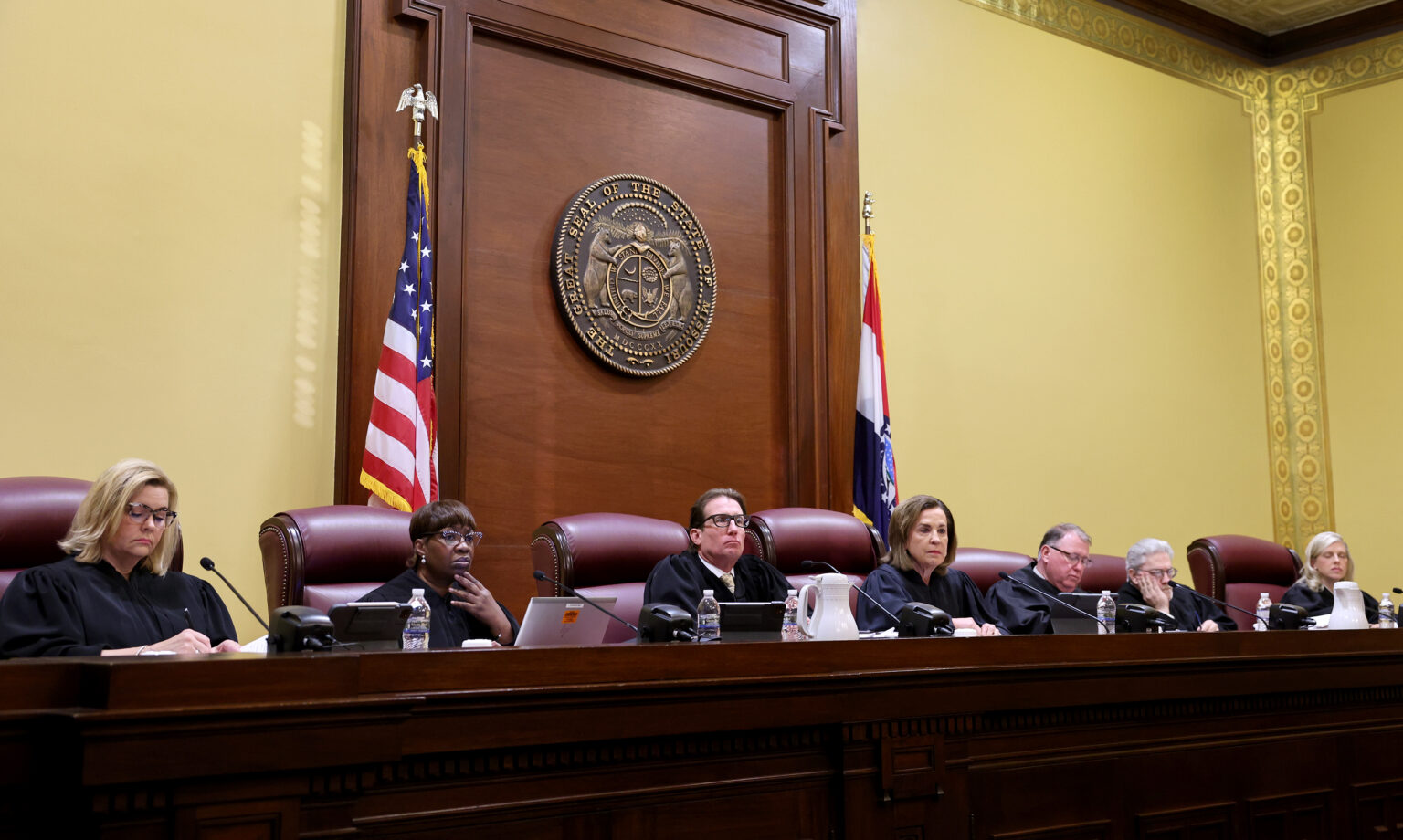14:36
News Story
Missouri Supreme Court rules amendment legalizing abortion will remain on ballot
The court ordered Secretary of State Jay Ashcroft to tell local election authorities to put Amendment 3 on the Nov. 5 ballot

The Missouri Supreme Court takes the bench on Sept. 10, 2024, in Jefferson City to hear a case questioning whether an amendment to overturn the state’s abortion ban will remain on the state’s November ballot. From left are Judges Kelly C. Broniec, Robin Ransom, W. Brent Powell, Chief Justice Mary R. Russell, Zel. M. Fischer, Paul C. Wilson and Ginger K. Gooch (Pool photo by Robert Cohen/St. Louis Post-Dispatch).
Missourians will have the opportunity to vote to enshrine abortion in the state constitution this November, the Missouri Supreme Court ruled Tuesday.
In a decision published less than three hours before the constitutional deadline to remove a question from the ballot, the Supreme Court reversed a lower court’s ruling that recommended the measure be stripped from the Nov. 5 ballot.
Secretary of State Jay Ashcroft “shall certify to local election authorities that Amendment 3 be placed on the Nov. 5, 2024, general election ballot and shall take all steps necessary to ensure that it is on said ballot,” the judgment read.
The court has not yet issued an opinion.
“This fight was not just about this amendment—it was about defending the integrity of the initiative petition process and ensuring that Missourians can shape their future directly,” Rachel Sweet, campaign manager for Missourians for Constitutional Freedom, the campaign behind the amendment, said in a statement.

In a lawsuit filed late last month, a number of anti-abortion lawmakers and activists sued Missouri Secretary of State Jay Ashcroft for certifying Amendment 3 for the ballot.
The suit was brought forward by state Sen. Mary Elizabeth Coleman, state Rep. Hannah Kelly, anti-abortion activist Kathy Forck and shelter operator Marguerite Forrest who in a statement Tuesday said the Supreme Court “turned a blind eye” in its ruling.
“The fight continues against the vile forces who have no regard for innocent life,” they wrote.
On the eve of the Supreme Court hearing, Ashcroft announced he was decertifying the measure, a potentially unprecedented attempt to rescind his previous decision in an attempt to block the measure from the ballot.
The Supreme Court judges said Ashcroft missed his statutory deadline to change his mind.
“Respondent Ashcroft certified the petition as sufficient prior to that deadline, and any action taken to change that decision weeks after the statutory deadline expired is a nullity and of no effect,” the judges wrote.
Amendment 3 — which had been stripped from the Secretary of State’s website on Monday — was again listed under 2024 ballot measures as of 3:30 p.m. Tuesday.
Judge calls Ashcroft’s characterization of abortion amendment ‘unfair’ and ‘misleading’
In order to get a citizen-led Amendment on the ballot, the campaign behind the measure must first collect enough signatures from six of Missouri’s eight congressional districts. When asked for signatures, state law requires that the amendment be attached in full.
The initiative petition circulated by Missourians for Constitutional Freedom did not include any current law that would be repealed, the issue at the crux of the lower court’s ruling.
There is also a section of state law that requires initiative petitions “include all sections of existing law or of the constitution which would be repealed by the measure.”
Attorneys for Missourians for Constitutional Freedom have said the amendment would not repeal the state’s current abortion law or take it off the books. Instead, they said, it would create a new law that would supersede much of the existing one because not every element of the current law would be rendered moot, including laws protecting women who get abortions from prosecution.
And, they added, anything that falls under the scope of the amendment would be left to the judicial system to interpret.
Cole County Circuit Judge Christopher Limbaugh did not agree. On Friday he ruled that the campaign did not meet the sufficiency requirement through a “failure to include any statute or provision that will be repealed, especially when many of these statutes are apparent.”
While Limbaugh recommended the amendment be taken off the ballot, he ultimately left the decision up to a higher court.
Four days later, the Supreme Court ultimately ruled in favor of Missourians for Constitutional Freedom.
“What this decision really says today is that we deserve to be on the ballot,” said Tori Schafer, an attorney with the ACLU of Missouri, which is part of the coalition behind the amendment. ”That people deserve to make this decision for themselves.”
If passed on Nov. 5, the amendment would go into effect 30 days later. At that point, Schafer said there will likely be a series of legal challenges to clarify what the amendment means.
“But it’s very clear that when the amendment goes into effect, our state’s total abortion ban is over,” Schafer said.
The amendment reads in part: “The government shall not deny or infringe upon a person’s fundamental right to reproductive freedom, which is the right to make and carry out decisions about all matters relating to reproductive health care.”
Abortion is illegal in Missouri with limited exceptions for medical emergencies. If the amendment passes by a simple majority, it would legalize abortion up until the point of fetal viability and protect other reproductive rights, including birth control.
Mary Catherine Martin, an attorney with the Thomas More Society who argued the case on behalf of the plaintiffs, called the Supreme Court’s decision a “failure to protect voters.”
“We implore Missourians to research and study the text and effects of Amendment 3 before going to the voting booth,” she said in a statement.

Forck, one of the plaintiffs, was among a handful of anti-abortion activists who remained outside the Supreme Court building once a decision came down.
“We are resolved firmly to let the people of Missouri know exactly how insidious this Amendment 3 is,” she said, later adding: “This is a very slippery slope.”
The Missouri Republican Party called the ruling “devastating.”
“This ruling marks the most dangerous threat to Missouri’s pro-life laws in our state’s history,” the party said in a statement Tuesday. “Make no mistake—this amendment, bankrolled by radical out-of-state interest groups, is a direct assault on Missouri families and the values we hold dear.”
So far, Missourians for Constitutional Freedom has raised more than $15 million for the campaign, including seven-figure donations from national groups whose funders are not listed, including the Fairness Project.
With the general election only eight weeks away, Democratic candidates drew on news of the Supreme Court decision to call on supporters.
“Voters will overturn Missouri’s cruel ban that has zero exceptions for rape and incest,” Crystal Quade, the Democratic nominee for governor, said in a statement. “And they deserve a governor who will protect the will of voters and the rights of every Missourian.”
Lucas Kunce, the Democrat running against incumbent U.S. Sen. Josh Hawley, took an opportunity to call out Hawley’s opposition to Amendment 3.
“The lies and lawfare,” Kunce said, “used by Josh Hawley and his allies to try to block a citizen-led effort to end their total abortion ban have failed.”
This story was updated at 4:50 p.m. to include reaction to the ruling.
Our stories may be republished online or in print under Creative Commons license CC BY-NC-ND 4.0. We ask that you edit only for style or to shorten, provide proper attribution and link to our website. AP and Getty images may not be republished. Please see our republishing guidelines for use of any other photos and graphics.




